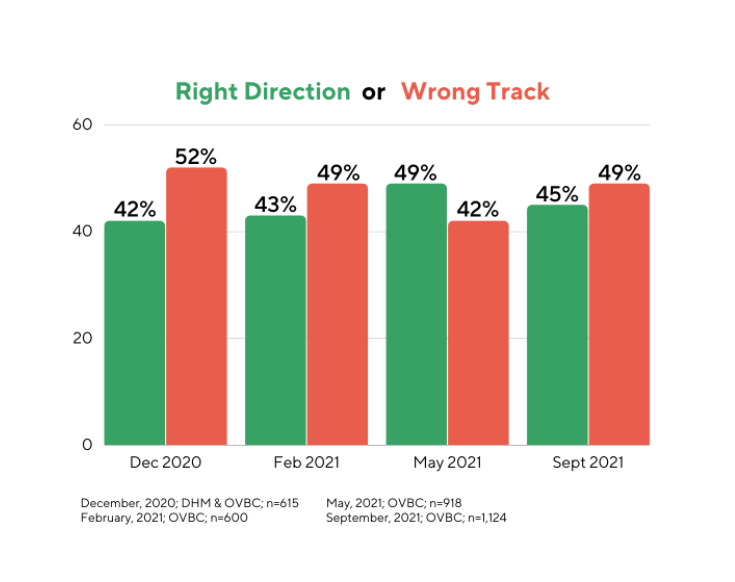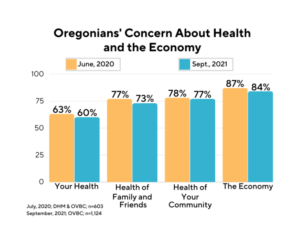
By ZACK DEMARS/Oregon Capital Bureau
While half of Oregonians say the state is headed in the wrong direction, views on the state’s economy have improved in recent months.
Those are two of the key takeaways from the Oregon Values and Beliefs Center, which surveyed more than 1,100 residents across the state’s regions and demographic groups over the course of a week late last month.
The first figure — with 49% saying the state is headed on the wrong track, compared to 45% who say its on the right track — is closer to the pessimistic lows of last winter than highs of this summer. In December, 52% held “wrong track” views, while only 42% said the same in May.
Chad Kernutt, a 31-year-old state employee in Albany, said COVID-19 restrictions passed down by state authorities while the public was restricted from most of the year’s legislative session was a sign of a state off track.
“The constant masking, the constant overregulation of businesses, telling them what they can and can’t do, and now the mandates on vaccines,” Kernutt said in a telephone interview. “I believe it should be handled at the local level.”
Feelings about the state’s direction vary on demographic lines. The youngest and oldest groups were more likely to say the state’s on the right track, and those in rural areas tend to be more pessimistic about the state’s overall direction, according to the survey, which had a margin of error between 1.8% and 2.9%.
When it comes to the COVID-19 pandemic, most Oregonians (56%) believe it’s not yet safe to open businesses and fully restart the economy. Just 36% of Oregonians said it’s urgently important to fully reopen the economy.
“No, I don’t think we’re quite there yet,” said Deb Runkle, a 62-year-old retiree in Bandon. “Personally, it scares the crap out of me because I’m compromised in the first place. Coming from that standpoint, it upsets me quite a bit when people don’t do what they’re supposed to do.”

Concerns about the pandemic center largely around the economy and community health more than individual health. Eight in 10 said they were “somewhat or very concerned” about the pandemic’s impact on the economy, and more than three-quarters had the same level of concern about the health of their communities.
Meanwhile, just 60% said they were concerned about their own health.
Views on the state’s economy are divided, too: About half say the economy is good or very good, while the other half calls it poor or very poor.
That’s up from previous surveys. Just 30% of residents rated the economy as good or very good in April 2021 and June 2020, pollsters said.
“We continue to hire a lot of people. We actually struggle to hire people, the market’s so hot,” said Jeff Jilot, 47, who works for a Portland software company and rates the economy as good.
Views about the economy fall on demographic lines: Those with higher incomes, men and college graduates, tend to have rosier views of the state’s economy.
Still, more than half the state’s residents (53%) say they’re worried about their personal financial situation, especially outside the Portland’s metro area.
Despite differences, 60% of respondents found room for agreement. That’s how many said there are things all Oregonians value about living in the state that “cut across political divides and represent common ground,” pollsters wrote. Top shared values included the state’s environmental quality, natural beauty and economic conditions.
“We all can come together when we want to help people,” Jilot said, saying, for example, most in the state agree on the need to help the homeless. “I do think folks want to see people happy, to see people succeed.”
- The Oregon Values and Beliefs Center, a nonpartisan charitable organization, has partnered with Pamplin Media Group and EO Media Group to report how Oregonians think and feel about various subjects.


